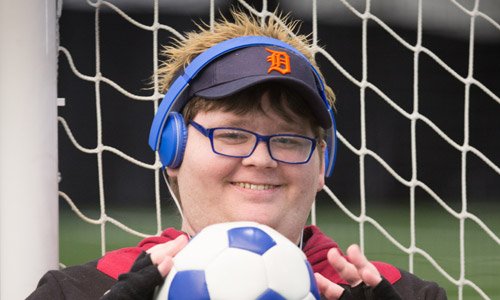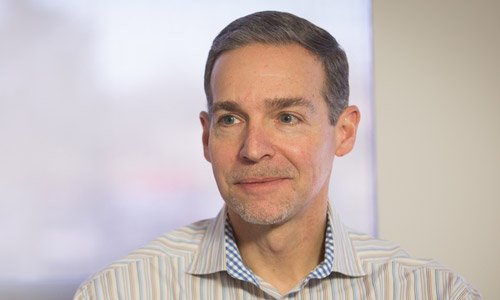Features

The ultimate research focus of OU’s Center for Autism will be on adults with Autism Spectrum Disorder and their quality of life, noted Chaturi Edrisinha, Ph.D., BCBA-D.
Features
Winter 2016
| by Sandra Beckwith
AUTISM RESEARCH
OU directs new focus on quality of life for adults
OU is known for autism programming for individuals of all ages ― from preschoolers to adults. In August 2014 special education researcher Chaturi Edrisinha, Ph.D., BCBA-D, joined the Center for Autism as director of research and Associate Professor in the Human Development and Child Studies department.
Dr. Edrisinha is a Board-Certified Behavior Analyst (BCBA) with a doctorate in autism and developmental disabilities. Dr. Edrisinha envisions the Center for Autism’s research arm as a clearinghouse and central campus location for trans-disciplinary collaborations addressing Autism Spectrum Disorder (ASD). She is currently evaluating the outcomes of OU’s existing outreach services (OUCARES) and determining best practices.
“My goal for the next few years is to publish the results so we can share what we’ve learned so far with the larger community serving those with autism.”
Ultimately, the Center for Autism's research focus will be on adults with ASD and their quality of life, she noted. Dr. Edrisinha also foresees the special education program expanding to include a doctoral program in ASD currently under development.
OU Center for Autism’s three initial projects
Adult quality of life research underway encompasses two employment studies and one quality of life study. A collaboration with Dr. Karen Markel at the School of Business Administration and Dr. Jan Graetz at the School of Education and Human Services, the employment studies will use data gathered from OU’s collaborative Extraordinary Ventures Michigan (EVM) microbusiness. EVM operates out of OU INC, a SmartZone Business Accelerator that is a joint effort of the City of Rochester Hills, the Michigan Economic Development Corporation (MEDC) and various industry partners.
The first project will use qualitative data from EVM’s laundry service staffed by adults with ASD to determine the benefits to the program’s stakeholders – OU, the Judson Center and the Autism Alliance of Michigan.
The second employment study will focus on the skills and abilities participants acquire through employment. It will also explore workplace policies and practices that are most effective in assisting adults with ASD. In addition, it will examine EVM’s unique challenges and how to best address them.
The third study, led by Dr. Edrisinha and conducted in collaboration with Dr. Charles Marks at the School of Health Sciences, will determine the how OUCA’s recreational programs such as soccer, swimming and basketball have made an impact on the physical, social and emotional well-being of children and adolescents with ASD.
It will incorporate physical measures ― strength, Body Mass Index and weight, for example ― to evaluate physical changes in in participants and quality of life indicators such as indices of happiness to determine social and emotional well-being. Dr. Edrisinha seeks to discern if there is an increase in the indices of happiness by observing if the participants in OUCA’s recreational programs are smiling, laughing and maintaining eye contact, increasing engagement; and whether she can attribute their behavioral changes directly to OUCA’s programs.
She expects future research to focus on the value of OUCA’s recreational and employable skills programs. Plans also include developing more multi-site studies and cross-campus research collaborations.
Doctoral program slated for 2017
In development and slated for 2017 is a Ph.D. in Autism Spectrum Disorders that would support these initiatives. The program will be the second of its kind in the country after the University of Texas at Austin, where Dr. Edrisinha received her graduate education.
The doctoral program development committee explored several options, Dr. Edrisinha said. To attract the type of student they desire, they ultimately determined that the most appropriate program model would be “intensive, exclusive, synergetic and residential.”
If approved, the four-year funded program will enroll just four to five students each year. Applicants must have a master’s degree in psychology, special education or a related field. It is expected that students will take eight credits per semester while doing a 20-hour research residency. Program funding will pay their tuition and a stipend for living expenses.
Dr. Edrisinha said she expects many of the program’s graduates to become professors advancing autism research.
“With more qualified educators at the college level, we will be able to help Michigan meet the demand for more professionals who know how to help the growing number of people in the state who are on the autism spectrum.”
Symposium takes on sexuality
On March 31, a different type of research will take place at a groundbreaking OU symposium, “Autism and Sexuality: Challenges and Hidden Dangers.”
The program is for professionals and families who want to explore the unique challenges that often arise among higher-functioning adolescents and adults with Autism Spectrum Disorders formerly referred to as Asperger Syndrome. Because these individuals often struggle to develop and understand social relationships, their healthy sexual development may lead to behaviors that others deem criminal. Presentations include an overview of the unique challenges and discussions will explore solutions.
“There’s so much our research can do to help this community,” Dr. Edrisinha said. “We are excited about moving forward by building on everything that has been done at OU so far.
“It is a very exciting time to be part of the ‘dream team’ at the OU Center for Autism.”
Sandra Beckwith is a freelance writer from Fairport, New York.
CHATURI EDRISINHA, PH.D., BCBA-Doctoral
Associate Professor of Human Development and Child Studies
School of Education and Human Services
Chaturi Edrisinha is a board-certified behavior analyst. She received her Ph.D. in autism and developmental disabilities and her M.Ed. in early childhood special education from The University of Texas at Austin.
An overarching agenda in Dr. Edrisinha’s research is to develop instructional and support strategies in order to foster independence and inclusion for persons with autism spectrum disorders. She has been successful in obtaining multiple research grants totaling more than $100,000. She published more than 60 peer-reviewed articles, conference papers, and book chapters in many prestigious journals, including the Journal of Applied Behavior Analysis, Research in Developmental Disabilities, and the Journal of Autism and Developmental Disabilities and presented at numerous national and international conferences.
Recent Research
Carpenter, M., Estrem, T. L. Crowell, R. L. & Edrisinha, C. (2014). Central auditory processing skills in young children with autism spectrum disorders. Journal of Communication Disorders,
Deaf Studies and Hearing Aids. 2, 112-120.
Roche, L., Sigafoos, J., Lancioni, G. E., O’Reilly, M. F., Green, V., Sutherland, D., van der Meer, L., Schlosser, R., W., Marschik, P., B & Edrisinha, C. (2014). Tangible symbols as an AAC option for individuals with developmental disabilities: A systematic review of intervention studies. Augmentative and Alternative Communication, 30, 28-39.
O’Reilly, M., Aguilar, J., Fragale, C., Lang, R., Edrisinha, C., Sigafoos, J., Lancioni, G., & Didden, R. (2012). Effects of a motivating operation manipulation of the maintenance of mands. Journal of Applied Behavior Analysis, 45, 443-447.
Edrisinha, C., O’Reilly, M.F., Choi, H., Sigafoos, J., Lancioni, G.E., (2011). “Say Cheese”: Teaching photography skills to adults with developmental disabilities. Research in Developmental Disabilities. 32, 636-642.
Edrisinha, C., O’Reilly, M. F., Sigafoos, J., Lancioni, G., & Choi, H. (2011). The influence of motivating operations and discriminative stimuli on challenging behavior maintained by positive reinforcement. Research in Developmental Disabilities. 32, 836-845.
Crain's Detroit Business: Judson Center and Oakland University Forge Bond
ADULTS WITH ASD
SBA researcher strives to build employer understanding, improve job prospects. BySandra Beckwith
Karen Markel, Ph.D., an associate professor in the School of Business Administration (SBA) and chair of its Department of Management and Marketing, is leading research that will build an understanding of how to improve employment opportunities for adults with disabilities and more specifically, those with autism spectrum disorder (ASD).
“My goal is to make a contribution that will make a difference with employment,” said Dr. Markel, who joined the OU faculty in 2001 and became interested in autism-related research while a member of the University’s Autism Committee.
Dr. Markel is working on three significant research projects. Two involve other organizations, while the third is a study of the literature available on the organizational side of employing people with autism.
Extraordinary Ventures of Michigan joint venture case study
Using qualitative data from a second wave of data collection now underway, Dr. Markel is examining a joint venture among three non-profit organizations that created the first of many micro-businesses on OU’s campus to employ people with autism.
Dr. Markel’s research goal is to learn how Extraordinary Ventures Michigan (EVM), Oakland University/Smiles for Children, the Autism Alliance of Michigan (AAoM) and the Judson Center can work together toward a common goal to establish and staff competitive microbusinesses designed around the employment and community engagement of people with autism.
EVM, now a 501(c)(3), began as a collaborative effort among these organizations.
Dr. Markel identified three areas of interest from the first wave of research. She will present her findings during a lightning talk in May at the Sustainability, Ethics, and Entrepreneurship (SEE) Conference in Denver.
After completing the data collection for this project, Dr. Markel will work with Management and Marketing Department colleagues Jae Kang, Ph.D., and Lizabeth Barclay, Ph.D., to present and publish the results of this research.
Multi-site employment case study
In her second project, Dr. Markel is in the process of conducting a multi-site case study to compare several organizations designed to address the unemployment problem of people with disabilities, including those with ASD.
She will conduct qualitative and quantitative research at EVM, along with two other organizations to compare the organizations’ purpose/mission; structure/culture; stakeholder engagement (i.e. organizational board, parents/guardians); and general operations.
“My goal is to help businesses see how to create an environment where people with disabilities can be successful at both securing and keeping jobs,” Dr. Markel said.
She expects to spend about a year gathering data before analyzing the information and compiling findings for publication in human resource publications.
Business management journal article
The third project emerges from Dr. Markel’s observation that while people with ASD are often either unemployed or underemployed, there isn’t much information in business management literature about recruiting and managing those with ASD in the workplace.
As a result, she and MBA candidate Brittany Elia have collaborated on an article that summarizes the literature available on the employment of people with ASD and offers recommendations for supporting them in the workplace.
Their article has been accepted for publication in the peer-reviewed Journal of Business and Management.
Dr. Markel, who teaches primarily human resources courses, hopes her research findings with all three projects will help employers learn more about how to recruit, retain, and manage people with ASD while taking advantage of the skills they bring to the organization.
The research has benefits in the classroom, too.
“I enjoy engaging in projects where you’re connecting with the community and bringing those experiences into the classroom,” she said. “It really adds value for our students.”
KAREN MARKEL, PH.D., SPHR, SHRM-SCP
Associate Professor of Management
Chair, Department of Management and Marketing
School of Business Administration
Karen Markel specializes in the areas of organizational behavior and human resource management. Her research focuses on the employment barriers for people with disabilities.
She has published in a variety of journals, including the Journal of Occupational Health Psychology, Journal of Applied Psychology, Journal of Business Ethics and Journal of Vocational Behavior.
Selected Publications
Markel, K. & Elia, B. (Accepted for publication). How Human Resource Management Can Best Support Employees with Autism: Future Directions for Research and Practice. Journal of Business and Management.
Barclay, L.A., Markel, K. S. & Yugo, J.E. (2012). Virtue theory and organizations: Considering persons with disabilities. Journal of Managerial Psychology, 27, 4, 330-346.
Markel, K.S. & Barclay, L.A. (2009). Addressing the underemployment of persons with disabilities: Recommendations for expanding organizational social responsibility. Employees’ Responsibilities and Rights Journal, 21, 305-318.
Barclay, L.A. & Markel, K.S. (2009). Ethical fairness and human rights: The treatment of employees with psychiatric disabilities. Journal of Business Ethics, 85, 333-345.


